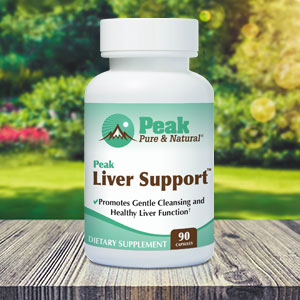Get Easy Health Digest™ in your inbox and don’t miss a thing when you subscribe today. Plus, get the free bonus report, Mother Nature’s Tips, Tricks and Remedies for Cholesterol, Blood Pressure & Blood Sugar as my way of saying welcome to the community!
What you should know about lead levels and high blood pressure

Exposure to toxins, including heavy metals, comes in many forms. But when it comes to threats we can’t see or put a finger on, it’s easy to feel defenseless and even easier to put them out of mind.
Most of us only worry about air pollution if we live in big cities — and then, may give it little thought because we feel there isn’t much we can do about it.
The same goes for exposure to heavy metal compounds that have proven dangerous to our health, like lead. We hear a lot about lead exposure in certain parts of the country. But let’s face it, if it’s not in your neighborhood, you may not be concerned.
That is, unless you’ve read how lead can be a bigger threat to your heart than smoking or cholesterol, and that lead from water may be the least of our worries.
Researchers continue to look into how lead damages our heart health, and how reducing exposure can reduce those risks — particularly when it comes to high blood pressure…
Lead raises your blood pressure
The American Heart Association has taken on the huge task of informing Americans about the lead threat. They’ve actually blamed three heavy metals for elevating heart disease risk.
Unfortunately, exposure to lead, is almost inescapable (I’ll explain shortly), but one group of Americans have been hit hardest — and are able to demonstrate what happens when that exposure begins to come down…
Compared to the rest of the U.S. population, American Indian communities experienced a disproportionately higher level of exposure to lead and other heavy metals. Experts have explained this is due to their “built environment” which includes lead exposure through well water, local waterways, foods, including canned goods, some herbs and spices and paint and dust.
But over ten years they saw an improvement they’re hopeful about…
Researchers started gathering health data on 285 American Indian adults through an extension of the Strong Heart Study in 1997 through 1999. The study participants lived in one of four tribal communities in Arizona, Oklahoma, North Dakota and South Dakota.
Blood lead levels were measured twice, once in an initial visit when the study began, and again in a follow-up visit between 2006 and 2009. Blood pressure readings were monitored over time and medical exams were performed including echocardiographs to assess their heart structure and function.
The researchers found that even small declines in blood lead levels were associated with long-term cardiovascular health improvements, including lower blood pressure. Throughout the study, the average blood lead level fell by 0.67 µg/dL, or 33 percent. And the higher the reduction in blood lead levels, the more significant the reduction in blood pressure…
Participants with average blood lead levels of 3.21 µg/dL who experienced reductions of about 1.78 µg/dL, or 55 percent, were linked to a 7 mm Hg reduction in systolic blood pressure. That’s an amount similar to what can be achieved with blood pressure-lowering medication.
“The reductions in blood pressure are also comparable to improvements you would see with lifestyle changes, such as getting 30 minutes of daily exercise, reducing salt intake or losing weight,” said Mona Puggal, MPH, an epidemiologist in the Division of Cardiovascular Sciences at the National Heart, Lung, and Blood Institute (NHLBI).
And according to Dr. Anne E. Nigra, a professor at Columbia Mailman School of Public Health, and senior author, “We saw that even small decreases in a person’s blood lead levels can have meaningful health outcomes.”
How much lead is too much
The researchers say the ten-year reductions in blood lead levels observed in the study are similar to those seen in the general U.S. population as a result of policies and efforts within the last 50 years to reduce lead exposure. However, they agree that more needs to be done…
Global research has blamed 5.5 million adult deaths from heart disease in 2019 on lead exposure, mostly from low- and middle-income countries.
So how safe can the average American feel?
An almost 20-year study on low-level exposure in the U.S. found that blood lead levels higher than 1 μg/dL are responsible for around 412,000 deaths in the U.S. each year. Of these, around 256,000 are from cardiovascular disease.
In the U.S. lead exposure comes from multiple sources:
- Common spices like cumin and coriander
- Decorative plates and glassware (especially the ones we put out during the holidays)
- Dark chocolate
- Drinking water (due to a combination of lead in pipes plus a compound in a chemical used for water treatment)
- Juices and some plant-based milks have been found to contain both lead and arsenic
- Rice grown in the U.S. has been found to contain toxic metals, including lead.
- Air pollution
Editor’s note: Have you heard of EDTA chelation therapy? It was developed originally to remove lead and other contaminants, including heavy metals, from the body. Its uses now run the gamut from varicose veins to circulation. Click here to discover Chelation: Natural Miracle for Protecting Your Heart and Enhancing Your Health!
Sources:
1. Reduced blood lead levels linked to lower blood pressure — EurekAlert!
2. The Contribution of Declines in Blood Lead Levels to Reductions in Blood Pressure Levels: Longitudinal Evidence in the Strong Heart Family Study — Journal of the American Heart Association
3. A new study says the global toll of lead exposure is even worse than we thought — NPR
4. Over 400,000 U.S. deaths per year caused by lead exposure — Medical News Today














